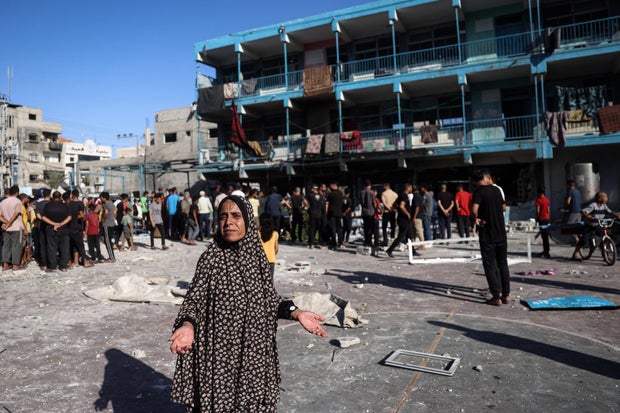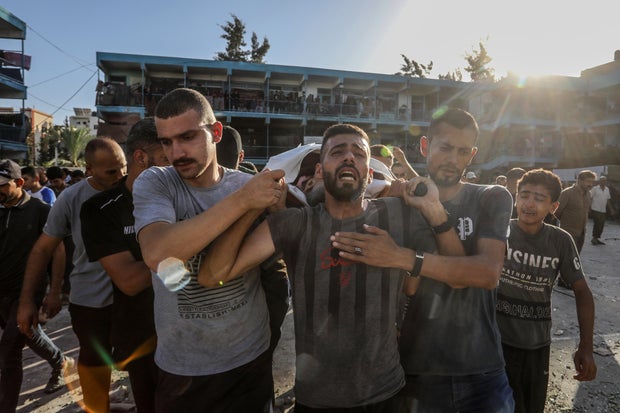Gaza Strip — Israel bombed a school housing displaced Palestinians in Gaza on Wednesday, killing 18 people including two staffers with the United Nations agency for Palestinian refugees, UNRWA, according to rescuers. The Israeli military described it as a “precise strike on terrorists who were operating inside a command and control center embedded within a compound that previously served as the Al-Jaouni School” in the central Gaza district of Nuseirat.
The school had already been bombed several times over the course of Israel’s 11-month war with Hamas. The militant group ruled over Gaza for almost two decades before it sparked the ongoing war with its unprecedented Oct. 7 terrorist attack on Israel. That attack saw militants with Hamas and allied groups kill about 1,200 people and take some 250 others hostage.
According to health officials in the Hamas-run Palestinian territory, who do not differentiate between civilian and combatant casualties, the war has killed more than 41,000 people in Gaza so far. The strike on the school came a day after Israeli bombs slammed into a sprawling tent camp for displaced Palestinians in the al-Mawasi designated humanitarian zone, killing at least 40 people, according to Palestinian medics.
EYAD BABA/AFP/Getty
The Wednesday strike flattened part of the U.N.-run facility where Gazans had sought shelter, leaving only a charred heap of rebar and concrete.
UNRWA says 6 staffers killed in Israeli raids near Gaza school
“For the fifth time, Israeli forces bombed the UNRWA-run Al-Jawni School, killing 18 citizens, including two UNRWA staff members, children, and women, and injuring more than 18 others,” Mahmoud Basal, spokesperson for Gaza’s Civil Defense rescue agency, said in a social media post.
UNRWA later said six of its staffers had been killed in two Israeli air raids on the Nuseirat school and its surroundings, calling it the highest death toll among its team in a single incident.
“Among those killed was the manager of the UNRWA shelter and other team members providing assistance to displaced people,” the U.N. agency said in a post on X. “Schools and other civilian infrastructure must be protected at all times, they are not a target.”
In a post on social media, IDF spokesperson Avichay Adraee said the military had sought to verify UNRWA’s claims about the killing of its workers in the raid, but that UNRWA had not responded.
“The IDF approached the agency to receive names and details in order to examine the allegations in depth, but UNRWA did not respond to these requests which were repeatedly conveyed to it,” he said, adding that “names published on social media sites and news channels” as being among those killed in the strike “belong to terrorists from Hamas who were involved in terrorist activities against the citizens of Israel and the forces of the Defense Army.”
Abed Rahim Khatib/Anadolu/Getty
Across the besieged strip, many school buildings have been repurposed to shelter displaced families as the vast majority of Gaza’s 2.4 million people have been repeatedly uprooted by the war.
Israeli forces have struck several such schools in recent months, saying Palestinian militants were operating there and hiding among displaced civilians — charges denied by Hamas.
The IDF did not elaborate on the outcome of the strike, but repeated its frequent assertion that “numerous steps” were taken to reduce the risk to civilians.
The U.N. said last month that nine UNRWA staff members were fired after an internal investigation found they may have been involved in Hamas’ Oct. 7 attack on Israel.
Survivors of the strike scrambled to retrieve bodies and belongings from the rubble, telling AFP they had to step over “shredded limbs.”
“I can hardly stand up,” said one man, holding a plastic bag of human remains. “We’ve been going through hell for 340 days now. What we’ve seen over these days, we haven’t even seen it in Hollywood movies. Now we’re seeing it in Gaza.”
Further north in the Gaza Strip, the civil defense agency’s spokesman Basal said three people were killed overnight in Israeli shelling on the Jabalia refugee camp.
In Gaza City, he said there had been two deadly strikes in the Zeitoun neighborhood — the first killing five people, including two children, and the second killing two and injuring several others.
West Bank, Hezbollah violence escalate as Gaza cease-fire talks languish
Months of negotiations mediated by Qatar, Egypt and the United States have so far failed to secure a truce.
A Hamas delegation met Qatari and Egyptian mediators in Doha on Wednesday, the militant group said in a statement, though there was no indication of a breakthrough.
Recent rounds of mediation held in Doha and Cairo have tried to hash out a framework laid out in May by President Biden, but both Israel and Hamas have publicly signaled deeper entrenchment in their negotiating positions as the violence has not only continued in Gaza, but escalated in two other key areas, fueling concern that without a truce agreement, the conflict could spread.
Tension has soared in the other Palestinian territory, the Israeli-occupied West Bank, which is not controlled by Hamas. The killing there by an Israeli soldier on Friday of an American activist has drawn criticism from Washington of the Israeli military’s tactics and demands for independent investigations.
The IDF said an initial investigation showed Aysenur Eygi was “highly likely” shot accidentally by one of its soldiers responding to a violent protest, but eyewitnesses have said she was shot in the head after the unrest died down and as she stood under an olive tree.
U.S. Secretary of State Antony Blinken called her killing “both unprovoked and unjustified,” and said the IDF must change its tactics, but U.S. authorities have not announced an independent investigation into the shooting as requested by the family. Eygi was also a Turkish national, and the Turkish justice department confirmed Thursday that it was carrying out its own investigation into her killing and would present its evidence to a U.N. court handling a genocide case against Israel brought by South Africa over the war in Gaza.
Further north, along Israel’s border with Lebanon, meanwhile, there’s mounting concern that Israel will launch a major offensive against the more powerful Hamas-allied group Hezbollah. The group, which like Hamas is backed by Iran, has exchanged increasing cross-border rocket fire with Israel for months, and Israeli officials have vowed to eliminate the threat.
U.S. and other Western officials have warned for months that if that crossfire develops into a more direct fight between Israel and Hezbollah, it could snowball into a wider regional conflict that draws a response from Iran or its regional proxy forces, which have already targeted U.S. forces in the region with rocket and drone attacks.



